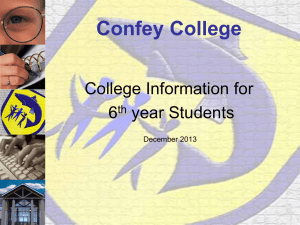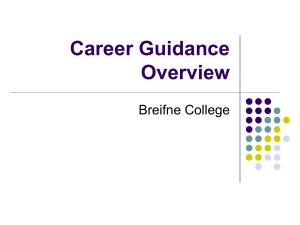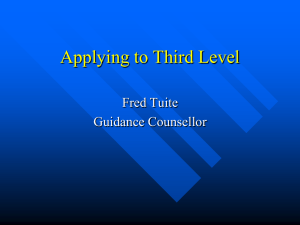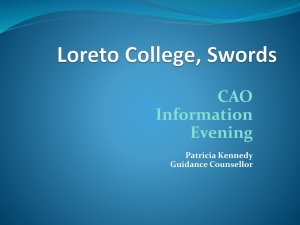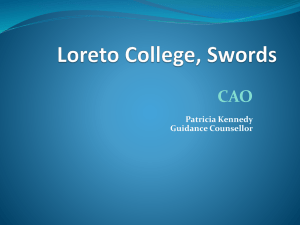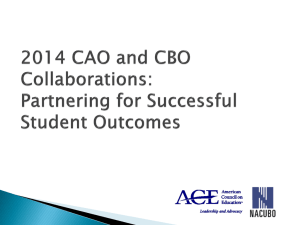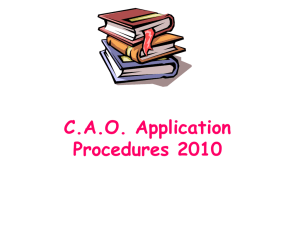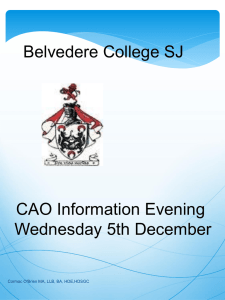here - Kildare.ie
advertisement
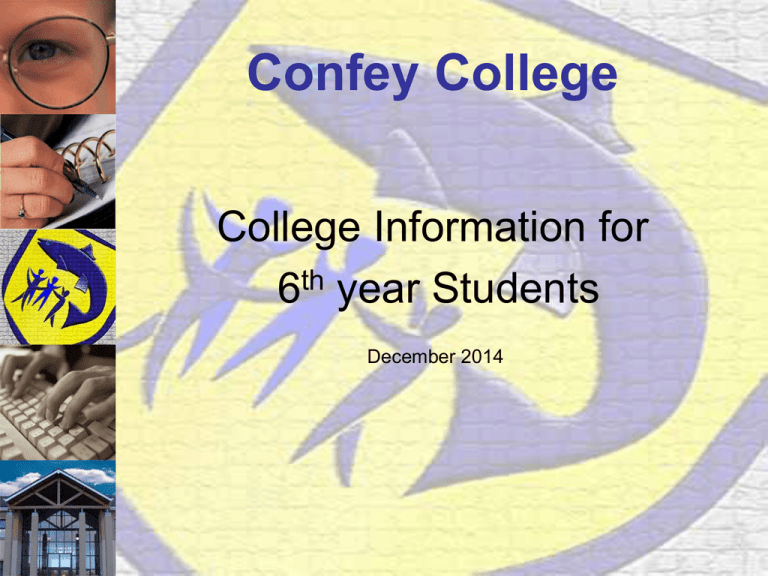
Confey College College Information for 6th year Students December 2014 Third Level Progression from Confey College 2014 • • • • • • • 111 students TCD:14, DIT:17 UCD:8 IBT:15 DCU:8 NCI:1 NUIM:19 ITT:2 NUIG:2 AIT:2 UCC:1 IADT:1 CIT:8 WD:1 LIT:1 WIT:1 MD:4 NCAD:1 National Skills Bulletin July 2014 (Solas) Expert group on Future Skills Needs Predict skill shortages in: • ICT (software developers, web, cloud, mobile, database, games, data analytics, customer relations), project managers, user support, network security, testing and troubleshooting Skill shortages • Engineering: tool design, polymer technology, process engineering, QC, validation, mechanical electrical and electronic, chemical, food • Science(R&D),science+business, • Science + sales, lab technicians Skill shortages • Business: (purchasing, marketing, sales, business analysis/statistics) • Finance: (risk, regulatory compliance, accounting, solvency, financial management, multilingual technicians), fraud, credit control • Health: (non-consultant hospital doctors, nurses - cardio, intensive care, geriatric ,oncology,theatre) Skill shortages • Sales: (tech sales, multilingual, customer support, online sales and marketing) • Craft: (tool making, CNC machining) • Transport:(international supply chain management) • Clerical: (multilingual accounts, debt collection) CAO Method of Application • Paper Application • Online Application Important Dates & Fees All Fees are non-refundable Fees Closing Date Normal Application (online or paper) €40 1 Feb 2015 (5.15pm) Online Discounted Rate €25 20 Jan 2015 (5.15pm) Late online Application €50 1 May 2015 (5.15pm) Late Paper Application €80 1May 2015 (5.15pm) Change of Mind Nil 1 July 2015 (5.15pm) Application Number • When applying online an application number appears on the Receipt of Online Application • Print receipt and keep • This number is private and will be used in all correspondence with applicant – it should be noted and kept safe– space on back of CAO Handbook Points System • In the CAO there are usually more applicants than places • Points system needed to select candidates • Calculated from ONE sitting of Leaving Cert only • Points from best 6 subjects counted Points System LCVP Grade Higher Ordinary A1 100 60 A2 90 50 B1 85 45 B2 80 40 B3 75 35 C1 70 30 C2 65 25 C3 60 20 D1 55 15 D2 50 10 D3 45 5 Distinction - 70; Merit - 50; Pass – 30 Points continued • Points for Foundation level • Some Colleges award points for Foundation Level Maths – ranging from 40 for A1 to 5 for C3 • Bonus points awarded for Higher Maths – 25 for a D3 or higher Important Issues • Two lists of choices 10 courses at Level 8 10 courses at Level 7/6 • Must be in genuine order of preference on each list NOT based on points from previous years Keep Record • It is very important that students keep a record of their list of courses and their order of preference • Use back of the book to keep record or save changes online College Courses • All college courses are listed as Level 6, 7 or 8 for students with Leaving Cert. which is Level 4/5 • Level 6 courses are usually 2 years and the Qualification gained is a Higher Certificate • Level 7 courses are usually 3 years and are called Ordinary Degrees • Level 8 courses are 3/4 or more years and are called Honours Degrees National Qualifications Framework – www.nfq.ie Minimum Requirements NUI Colleges (UCC, NUIM,UCD, NUIG, NCAD, Shannon College of Catering, Milltown Institute) require: • Irish, English and a third language* • 3 other subjects • At least 2 HC3’s • Maths for all courses except Arts, Law and Social Science(except for UCD) • Science, except for Arts, Law, Social Science and Commerce * For entry to Engineering & Science Courses a 3rd language is not required Students entering Nursing may substitute any other recognised subject for the 3rd Language Students entering NCAD may present Art in place of the 3rd Language. Minimum Requirements cont. TCD requires: • English, Maths and another language (Irish, French, German or other) • 3 other subjects • At least 3HC3’s DCU requires • Maths and English or Irish • 4 other subjects • At least 2HC3’s Minimum requirements cont. DIT and other IT requirements: • English or Irish and Maths • 4 other subjects – for Level 8 courses • 3 other subjects – for Level 7 courses • At least 2HC3’s – for Level 8 courses Essential Subjects Many courses, especially at Level 8 will require you to have a particular subject and sometimes even to Honours level. For example: Engineering – Honours Maths is required for some colleges and often a Science subject also Medicine and other Paramedical courses – one or two science subjects (Chemistry very important) Essential Subjects cont. Nursing – must have a science subject – not necessarily Biology (must be another laboratory science subject) Primary Teaching – Must have Honours Irish to get straight into Teacher Training Languages – for all NUI Colleges you must have a modern language (except for Science, Engineering, Nursing and NCAD courses). Business & Accounting – not essential for any course but would make college life easier if you intend to choose this type of career/course Exemptions to language Colleges give exemptions to some students for the language requirements if they have a specific diagnosed learning difficulty – perhaps dyslexia, or if they have been out of the country for much of their education. This needs to be applied for and the school can help with that. Trinity Feasibility Study for students entering college in 2015 • Involves prospective students of Law (10 places), History (10 places), Ancient and Medieval History (5 places) • Operated in partnership with CAO • Assessment of academic ability and potential of applicant Trinity Feasibility Study • Three modalities used to assess applicants • Leaving Certificate results • Relative Performance Rank (performance relative to other college applicants from student’s school) • Personal and contextual Data Trinity Feasibility Study • Information must be submitted online through the CAO by 1st February 2015 • Further details are available at www.tcd.ie/undergraduatestudies Student Responsibility It is the student’s responsibility to: • Research thoroughly any courses for which they are making an application • To be familiar with all aspects of the application system used by CAO, including deadlines, rules, fees, procedures etc. • To get all applications in on time, including CAO, UCAS, PLC. Offers of Places • CAO assumes that courses are in order of preference So – in Round 1 offers • Students are offered the course which is highest on their preference list for which they are eligible and have the points • Students may be offered one course from each preference list • Students then choose which offer to accept What happens to lower preferences? • All preferences below the one you are offered disappear from your application Round 2 and subsequent rounds • Places that have not been accepted in Round 1 are offered to the next eligible students in Round 2 • Students may be offered a higher preference • A student may accept a new offer and that cancels a course they previously accepted • Rounds 3 and 4 may mean new offers to a small number of students Random Selection • At time of application all applicants are given a random number, like a lottery • Applicants are offered places in order of merit according to their points • When a number of places are left and the next eligible candidates are all on the same points, the random numbers are used to fill the last places Change of Mind • Between May and July students can amend their choices as often as they like either online or on paper and at no extra cost. Advise to use sparingly • Restricted Courses cannot be added to their lists after 1 February. • Restricted courses are ones for which there are early assessment procedures, e.g. aptitude test, interview, portfolio or performance Resources • College Prospectus/websites • CAO website – www.cao.ie (NB Alert List) • Qualifax website – www.qualifax.ie • Careersportal – www.careersportal.ie • Careersworld – www.careersworld.com • Solas – www.solas.ie • Teagasc- www.teagasc.ie • www.nursingcareers.ie CAO Timetable entry 2015 5 November – Online application facility opens - Change of course choices (free) facility opens 20 January - Early online application date – reduced fee 31 January - Closing date for online change of course choices(free) 1 February - Normal closing 15 February - Statement of course choices sent to paper applicants CAO Timetable continued March/April – Tests/interviews for restricted courses 1 May - Late application closing 2 May - Online change of mind facility opens Before end May – Statement of Application Record sent to all applicants 1 July – Change of Mind closes Mid August - Round 1 Offers Late August - Round 2 Offers Higher Education Access Route (HEAR) • A third level admissions scheme for school leavers from socio-economically disadvantaged backgrounds – changing circumstances for some families • School leavers who have the ability to benefit from and succeed in higher education and who come from socio-economic groups in Irish society that are under-represented in third level. • Supplementary form to be completed with CAO application online • Information available from www.accesscollege.ie www.cao.ie Points reduction and other supports while in college. NB – not all colleges. Disability Access Route (DARE) • The Disability Access Route to Education (DARE) is a supplementary admissions scheme for school leavers with disabilities which operates on a reduced points basis • School leavers who have the ability to benefit from and succeed in higher education but who may not be able to meet the points for their preferred course due to the impact of a disability www.accesscollege.ie and www.cao.ie Points reduction and other supports while in college. NB Not all colleges HEAR & DARE – continued Indicate on CAO form whether applying or not – By 1 February 2015 Online forms to be completed by 1 March 2015 Extra information in post to reach CAO by 1 April 2015 Be sure to get proof of postage for these documents Colleges outside HEAR & DARE • Most colleges that are not in the HEAR & DARE schemes have access programmes of their own • Check their websites • Supports offered to eligible students and/or reduced points Alternative routes Remember that there are many ways to reach the career of choice. If the points needed to do a Level 8 course are not achieved, then one could start at Level 6 or 7, and work one’s way up, - in many careers and courses, but not all. Post Leaving Cert Courses Post Leaving Cert Courses (PLCs) are available in many colleges in Dublin and around the country. There are courses in almost everything you could wish for Entry to these courses is based on an application to the college and an interview. Not on Points! Not in CAO! They can be used to improve your prospects of entry to 3rd. Level Colleges, or to gain a qualification Courses are from 1 – 4 years, with qualification from Level 5 to 8 PLC Courses • Wide range of courses • Some lead to 3rd level – in some cases into 2nd or 3rd year • Some Pre-University courses – Arts, Science, Engineering & Business – improve opportunity to gain entry to 3rd level • Portfolio courses • Some course lead to employment When to Apply to PLC Colleges • After college Open Days,e.g. – from November for Beauty Therapy in Senior College Dun Laoghaire, December 11, 2013 for Senior College Ballyfermot, others as per web sites – up to January/February. Early application recommended as huge pressure on places now. • Interviews held from Jan/Feb/March onwards. Offer of places before summer. Financial Assistance/Fees • Free Fees Initiative – Free tuition fees in 3rd level colleges for eligible students on undergraduate courses – minimum of 2 years (does not include payment of college registration, examination and services fee) • Eligibility of non-EU nationals, or EU citizens who have lived outside EU, needs to be checked on an individual basis to each college admissions office • Grants available see www.susi.ie for further details Colleges in Northern Ireland/UK • UCAS system apply online • Maintenance grants available depending on means. UK student loans available • Apply from September onwards • Deadline 15 January but strongly recommend apply earlier. Deadline for Oxford/Cambridge and Veterinary and Medicine - 15 October Apprenticeships • Student must find own employer • Employer must register trainee with Solas or qualifications not valid • Apprenticeship usually takes 4 years • Some PLC courses good for helping to get apprenticeship SOLAS Skills Training • Short courses in various skills • Trainees are paid allowance while training • Suitable for students who can’t find apprenticeship – often helps them make contact with employers • Register with local employment office after Leaving Cert – can’t register while still in school and apply through Solas Remember • There are opportunities for all • Over 1300 courses available through CAO • PLC courses – apply to each college individually • Career Guidance available in school for all. Any queries about applying to college contact gclarke@confeycollege.org
